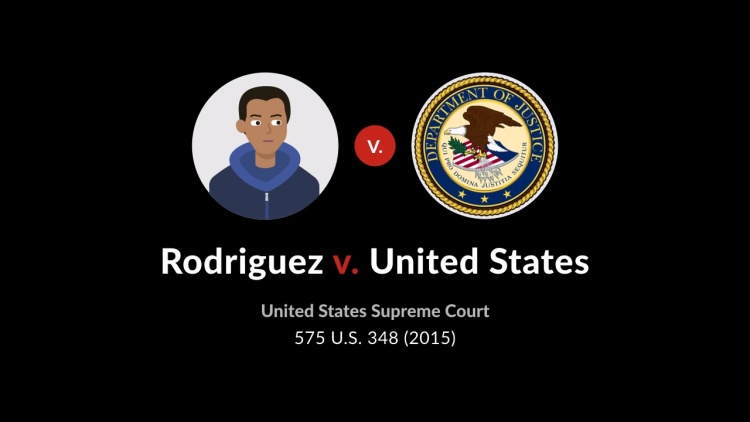Rodriguez v. United States
United States Supreme Court
135 S. Ct. 1609 (2015)
- Written by Robert Schefter, JD
Facts
A Nebraska K-9 police officer conducted a traffic stop of Dennys Rodriguez (defendant) at 12:06 a.m. after Rodriquez drove his vehicle onto the shoulder of a highway in violation of state law. The officer questioned Rodriguez and his passenger and collected their driver’s licenses, as well as the vehicle registration and proof of insurance. The officer requested backup, ran background checks of both men, and issued both men written warnings. The officer then requested permission to walk his dog around the vehicle, but Rodriguez refused. At 12:33 a.m., seven or eight minutes after the warnings were issued and backup arrived, the officer led his dog around the vehicle. The dog indicated a hit, the vehicle was searched, and drugs were found in the vehicle. Rodriguez was convicted in federal district court on charges brought by the United States government, and his suppression motion was denied by the United States Court of Appeals for the Eighth Circuit. The court based its ruling on Eighth Circuit precedent that permitted drug sniffs within a short time after completion of a traffic stop as long as the intrusion was deemed to have been de minimis. The United States Supreme Court granted certiorari.
Rule of Law
Issue
Holding and Reasoning (Ginsburg, J.)
Dissent (Thomas, J.)
Dissent (Alito, J.)
What to do next…
Here's why 911,000 law students have relied on our case briefs:
- Written by law professors and practitioners, not other law students. 47,100 briefs, keyed to 997 casebooks. Top-notch customer support.
- The right amount of information, includes the facts, issues, rule of law, holding and reasoning, and any concurrences and dissents.
- Access in your classes, works on your mobile and tablet. Massive library of related video lessons and high quality multiple-choice questions.
- Easy to use, uniform format for every case brief. Written in plain English, not in legalese. Our briefs summarize and simplify; they don’t just repeat the court’s language.





